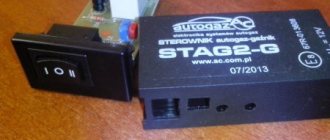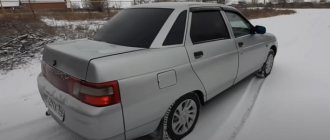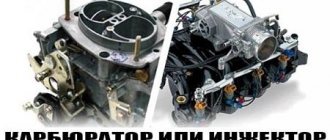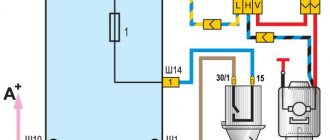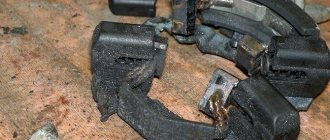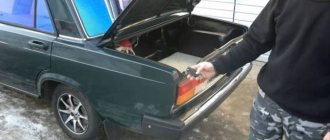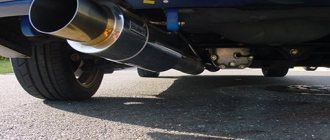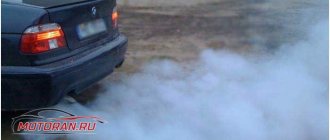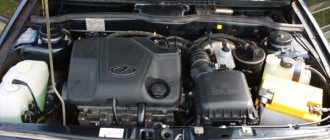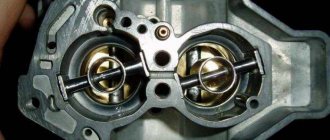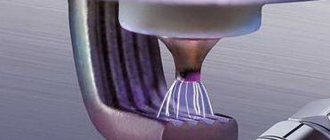The appearance of characteristic loud pings in the exhaust system is a sign of a certain malfunction that requires immediate elimination. Ignoring this problem can further lead to serious consequences for the exhaust system elements, burnout or rupture of the muffler/resonator, problems with the catalyst and the engine itself.
Typically, dips and pops in the muffler occur spontaneously or only under certain conditions, during idling, during transient conditions, during sudden acceleration, etc.
We also recommend reading the article on how to repair a muffler on a car yourself. From this article you will learn about affordable ways to repair a car muffler with your own hands in a garage.
In parallel with this, the driver may notice not only a short-term lack of response to pressing the gas pedal and subsequent popping noises in the exhaust pipe, but also a general decrease in engine power, deterioration in acceleration dynamics, and increased fuel consumption. Also, a problem of this kind is accompanied by difficulties in starting the internal combustion engine, after which popping noises in the muffler at idle appear after the engine starts idling.
In this article we will look at why popping sounds in the muffler occur when you press the gas, where the shots and popping noises in the muffler come from when cold and in other operating modes of a power unit with a carburetor and injection power system.
Gas pops: why do they occur and what is the reason? How to get rid of popping noises when running on gas?
Welcome to HBOshnik.
Today we’ll talk about such a nuisance as popping noises on cars with HBO. The reason is popular among owners of 2nd generation gas equipment and very painful for everyone who has encountered it. Gas pump pops can also be observed on other generations due to certain malfunctions. I propose to talk about the most common reasons why pops occur on HBO, as well as how to deal with it.
The occurrence of popping noises when working on gas can have different origins; in some cases, the reason is a “poor” hot water supply (gas-air mixture). During the so-called “purge” (at the moment when both the inlet and outlet valves are open), with proper mixture formation and ignition, the hot water has already completely burned out, so there are no pops.
However, everything changes if these processes are disrupted, when, for example, a misfire occurs in a cylinder or the mixture is “poor” for one reason or another. This can happen for various reasons, for example, due to the inertia of the gas reducer, which does not have time to supply the required portion of gas, as a result the mixture turns out to be lean and the ignition process occurs slowly. In this case, the remains of hot water that has not completely burned out can ignite a fresh portion of hot water in the intake manifold. In this case, a characteristic loud “pop” is most often heard, which is formed as a result of the much larger volume of the intake manifold chamber compared to the volume of the cylinder.
As I already said, a similar phenomenon is typical for the first HBO systems of the 1st and 2nd and 3rd generations; on the 4th and subsequent generations, such a “disease” is much less common, because after the 3rd generation, gas the equipment was improved and there was already clean air in the intake manifold, not hot water.
Faulty ignition system
Another reason that the fuel does not burn completely and popping sounds from the exhaust pipe can be heard is that the ignition is not set correctly. In particular, if the ignition is late , then popping noises in the muffler at idle and at high speeds are inevitable. This fact is very simple to explain. A situation occurs when a spark appears at the moment when the supply valve has already fully opened, as a result of which part of the fuel does not have time to burn, but leaks into the manifold. And if the ignition is “early” , then it will “shoot” at the air filter.
Checking the spark plugs
Also, the cause of incomplete combustion of fuel can be a weak spark. In turn, this is a consequence of one of the facts:
HBO pops most often occur for the following reasons:
- Cylinder misfires;
- Accumulation of fuel in the exhaust manifold for one reason or another;
- Poor gas-air mixture;
- Irregularities in the ignition system (spark plugs, explosive wires, coils and other system elements);
- Valve malfunctions;
- Air leak;
- Incorrect operation of injectors;
- Problems with the gearbox (incorrect settings, problems with filters, condensation accumulation).
As you can see, the causes of gas pump pops can be very different and the solution to this problem comes down to finding and eliminating one of the existing faults. In the event of such a breakdown, you should make sure that all of the above components are in order and are not involved in the appearance of popping noises during operation on gas.
Source
Incorrect thermal clearance
The thermal gap is the distance by which individual parts of the engine increase in volume when heated. In particular, it is between the valve tappets and the camshaft cams. An incorrectly set thermal gap is one of the possible reasons why the muffler shoots.
The thermal clearance of the cylinder head valves can be adjusted. Therefore, to eliminate this problem, it is enough to adjust the valves. This procedure is always carried out on a cold engine.
ICE 405 euros 2 exhaust sometimes shoots on gas. what is the reason.
One of the most common causes of shots in the muffler is a malfunction of the carburetor. To eliminate it, simply replace the air filter and adjust the fuel supply to the carburetor. You may also hear popping noises due to delayed ignition. A spark passes when the intake valve opens and fuel enters the manifold. When the timing belt is stretched, a similar situation occurs: the intake valve opens before fuel combustion. And therefore, the remaining fuel burns in the exhaust pipe.
2 Good answer
Is it possible to cut out the catalyst in the car and install a flame arrester?
It is possible and necessary. The flame arrester does not provide any “huge resistance”, but rather allows the engine to breathe normally. It is essentially a small resonator. There are collector ones, which are installed in the exhaust manifold, and there are main ones, with the catalyst located under the body. Their main task is to reduce temperature and eliminate noise. If you simply knock out the catalyst, a ringing sound will appear from an empty can. In order for the engine to operate correctly and without errors, it is best to eliminate catalyst control using chip tuning https://negudit.ru/uslugi/chip-tyuning-dvigatelya
Hello, when you press the gas, the car picks up speed and drives hard
If the car picks up speed normally, but accelerates slowly, provided that the gearbox is manual, the clutch may be slipping, this may be accompanied by a characteristic smell of burning linings. If it is an automatic transmission, you need to first check the transmission fluid level.
4 Good answer
Why does the engine shoot into the muffler?
The shot can occur on both carburetor and injection engines. Popping occurs when unburned fuel leaves the engine and ignites in the vehicle's exhaust system.
The main causes of popping may include the following:
1) Poorly adjusted ignition timing or faulty ignition module, which causes a problem in synchronizing the movement of the piston in the engine and the timing of the spark.
2) Mixed spark plug wires.
3) Violation of valve clearances or their wear (damage).
4) Faulty knock sensor on the injection engine.
Carburetor not tuned
Often the reason that the engine shoots into the muffler is an incorrectly configured carburetor. Its task is to create a fuel-air mixture, which is then supplied to the engine. If it is configured in such a way that the mixture is oversaturated with gasoline, a situation similar to that described above is created. The solution here is to check and adjust the “carb”.
The first step is to check the fuel level in the chamber where the float is located. Each carburetor is individually adjusted and has its own level. However, if its cover is removed, the float should be flush with the level of the cover. If this is not the case, adjust the level. Also be sure to check the integrity of the float . If it is damaged, fuel may leak into it, causing it to display the level incorrectly.
The reason that the carburetor shoots into the muffler may also be the jets. They are either configured incorrectly or become clogged over time. If the air jet does not supply enough air, the mixture becomes oversaturated with gasoline with the result described above. Often this malfunction occurs when the engine goes from idle to higher speeds, or with a sharp increase in speed (acceleration). It is necessary to check the condition of the jets and clean them if necessary.
How does this happen
The process of operation of an internal combustion engine is associated with the combustion of the gas-air mixture in the cylinders. If there is an irregular spark formation, periodic problems arise with the ignition of the mixture in the cylinder. The consequences of such irregular ignition are manifested by popping noises in the intake and exhaust systems.
Problems in the intake system, which are characterized by a flash, most often arise due to the slow combustion of the fuel mixture. During the exhaust stroke, the mixture still continues to burn. Because of this, a small amount of the fuel mixture remains directly in the cylinder.
At the moment both valves open simultaneously, the residual mixture ignites a portion of the new one. At the moment of ignition, the flame instantly spreads from the cylinders to the intake channels. At this time, the driver hears a distinct popping sound. Thus, an explosion occurs at the inlet.
During the release process, an even stronger explosion is possible in the muffler. This happens due to the accumulation of unburned mixture in the cylinders. When you press the gas sharply, these residues ignite and a loud “shot” is heard.
Faulty timing belt
Malfunctions in the operation of the gas distribution mechanism are generally similar to problems with ignition. In particular, the exhaust valve opens at a time when the gasoline has not yet burned out. Accordingly, it enters the exhaust gas removal system, leading to the already familiar popping sounds in the muffler.
There are several causes of malfunctions in the timing system:
Usually, if the timing belt is faulty, popping noises in the muffler are heard when the engine is warm . If the engine is “cold”, then they are not there. This is another indirect evidence of the timing's guilt. However, to find out exactly, it is necessary to perform additional diagnostics.
Causes of gas pop
The occurrence of popping noises when working on gas can have different manifestations. Below we will look at the most common reasons.
Lean mixture (causes of occurrence)
In most cases, the reason lies in a lean gas mixture. A lean mixture is an excessive excess of air over gas. As a result, such a mixture may not ignite the first time. This is what causes the cotton to pop. The main causes of a lean mixture may be:
- gas supply transmitted by the dispenser,
- dirty gas filter,
- air leak in the system.
Armored wires
A fairly common problem on cars that have traveled more than tens of thousands of kilometers. If the wire insulation is damaged, the current may not be sufficient to produce a spark at the spark plug. As a result, the candle does not ignite the mixture the first time, and cotton is formed.
Diagnosing a problem with armored wires is quite simple. It is necessary to open the hood at night, in complete darkness, and carefully inspect the engine compartment. If the problem is in the high-voltage wires, from time to time a “glow” of the wire will be visible under the hood.
Candles
Plugs, or more precisely, an incorrectly set gap in the spark plugs, can cause gas popping during LPG operation. This happens due to untimely ignition of the gas-air mixture in the cylinders. As a result, fuel ignition occurs on the return path of the valve or does not occur at all. In the latter case, this leads to the formation of an unburnt mixture.
Ignition coil
The ignition coil is also quite capable of causing unstable operation of the entire system. This unit can only be diagnosed by replacing it with a previously serviceable one. But the problem with the coil will appear not only when the car is running on gas.
Gearbox
Incorrect settings or untimely maintenance of the gearbox can lead to unstable operation of the entire gas equipment. Read about how exactly to carry out maintenance in this article.
You should also pay attention to the installation of the gearbox. Look how far the gearbox is from the intake. A tube that is too long can also contribute to what causes the gas to pop.
Problems with injection cars
According to statistics, the problem of shots in the muffler is more often encountered by owners of carburetor cars. However, it can also occur with a fuel-injected car. However, their reasons for popping are different.
In such machines, the engine operation is controlled by the ECU based on information from numerous sensors. And if any of them gives false information, this leads to incorrect motor control. For example, if the air intake sensor is faulty, this will lead to incorrect formation of the fuel mixture. You should also check the crankshaft position sensor. If it provides information about a displacement of one tooth, this will also lead to incorrect operation of the system. The throttle position sensor, Hall sensor and other elements may fail.
